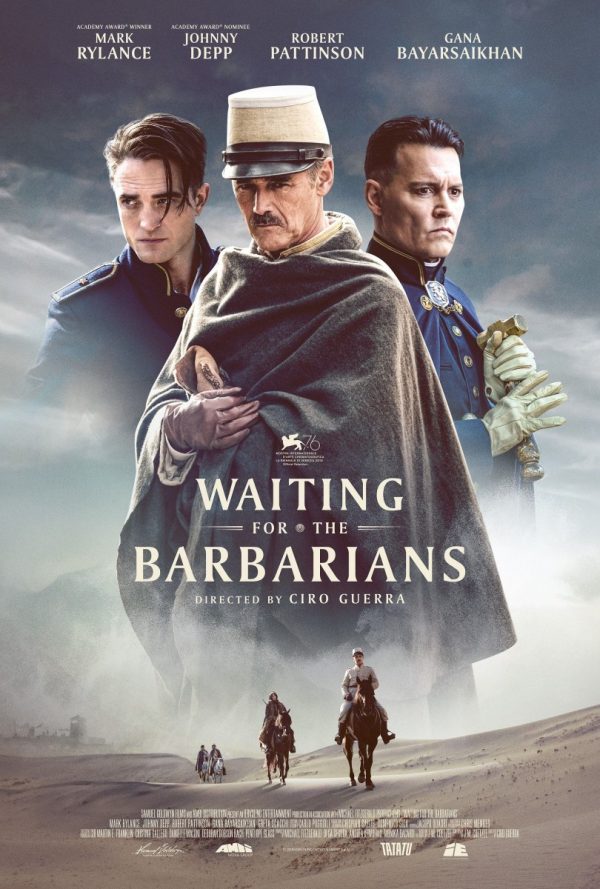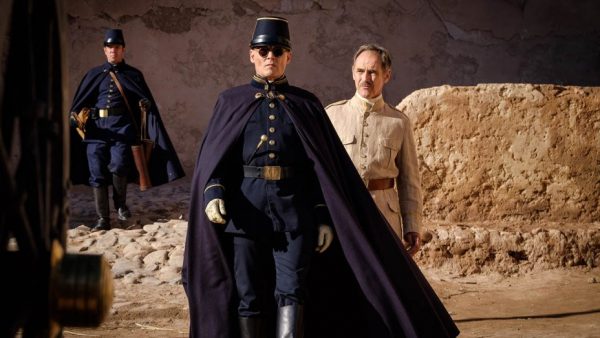Waiting for the Barbarians, 2019.
Directed by Ciro Guerra.
Starring Mark Rylance, Johnny Depp, Robert Pattinson, Gana Bayarsaikhan, Greta Scacchi, and David Dencik.

SYNOPSIS:
In a distant, unnamed colonial outpost in the Middle Eastern desert, a Magistrate begins to question his loyalty to the Empire after the arrival of state security officers with morally questionable methods.

For a movie centered around so much horror both figurative and literal, this adaptation of J. M. Coetzee’s 1980 novel – penned by Coetzee himself, no less – sees director Ciro Guerra (Birds of Passage) take a surprisingly genteel approach to the material. It’s a bold angle for sure – and swashbuckling can only say so much about world history – albeit one that’s ultimately as meandering as it is fitfully effective.
At its core, Waiting for the Barbarians is a relatively simple story about the trauma of colonisation; not only the physical and cultural cost, but also the spiritual toll. And, bluntly, of how little truth is ever bore from violence.
Taking place in an intentionally ambiguous setting and time period, the story nevertheless unfolds at a stark colonial outpost, presided over by a meek and passive Magistrate (Mark Rylance). The predictable mundanity of his work and life is soon upended by the arrival of Colonel Joll (Johnny Depp), a severe Empire security officer who soon enough begins torturing the locals in order to gain intel about a possible “terrorist” attack. The Magistrate then confronts his conscience as he decides how to deal with the dark pall cast over the outpost by Joll’s periodic appearances – and speedy, spectral exits.
The film’s gossamer-thin allegory for real-world colonialism speaks for itself, offering up a familiar yet intermittently powerful indictment of not only the brutal forces who administered the most heinous acts of barbarism, but those effete authorities who failed to affect sufficient change within the system.

It is, beyond this, clearly a film sold less on the presence of its leading man and more its two supporting players – Depp and Robert Pattinson. And yet despite this, Waiting for the Barbarians strikes a shockingly sedate clip; the first thing the Magistrate and Joll talk about is sunglasses, and from there the script’s dialogue runs the gamut from poetically mannered to aggressively languorous, even prosaic, with occasional dips into shameless heavy-handedness.
But let’s discuss the elephant in the room first. Neither Depp nor Pattinson are in the film for much time at all. Depp’s role basically amounts to a featured, extended cameo, showing up for a handful of scenes scattered throughout, often with long chasms of time between them. Pattinson, who plays one of Depp’s cruel underlings, Officer Mandel, meanwhile doesn’t even show up until the 75-minute mark.
Yet if you’re able to accept this, there is a stark, efficient beauty to the film. Oscar-winning veteran cinematographer Chris Menges ironically teases a sense of time and place in a movie which, narratively speaking, doesn’t have one by design. Nevertheless, Menges’ beautiful work is backed up by evocative Moroccan shooting locations and first-rate production design, ensuring the end result feels at all times authentic as a piece of adjacent history. And don’t sleep on Giampiero Ambrosi’s haunting score, either.
As sumptuously produced as the film is, though, the molasses-slow pacing is certain to divide, with the first two acts ambling their way towards a slightly more eventful, visceral third reel. For every fittingly stoic moment of unsettling calm, there is also one of empty boredom, and it makes Waiting for the Barbarians quite the frustrating sit.

The performances help maintain interest often, at least. Rylance, one of cinema’s great purveyors of quiet dignity, anchors the entire production, especially with his higher-profile co-stars so often absent. He has a charming presence and does solemn wonders with the more lyrical dialogues throughout. Depp, meanwhile, brings a refreshing severity to Joll, miles away from the mugging nonsense which has characterised his late-career work, and which he easily could’ve leaned back on.
Pattinson’s role is disappointingly scant, with much of his 20-or-so minutes spent sat in the background doing little, yet he nevertheless plays an entertaining asshole, despite Mandel rarely rising above a thin sketch of an authoritarian tool. It would be remiss not to mention Gana Bayarsaikhan, who is terrific in her few scenes as an indigenous woman who the Magistrate becomes besotted with. There’s a nerve-janglingly haunting sequence where she explains the atrocities she’s been subjected to, and in its own way it forms the moral center-piece of the entire movie.
Pretty much everyone involved with the project is doing good work, but that sadly doesn’t quite mean it adds up to the greatness you’d expect from the constituent components. It’s clear that an angrier movie is chomping at the bit to burst out of one that, no matter its grim subject matter, feels oddly tepid and not quite persuasive enough.
Ultimately a bit too mellow for its own good – despite a gripping Mark Rylance performance – Waiting for the Barbarians amounts to a half-interesting, half-boring slog.
Flickering Myth Rating – Film: ★ ★ ★ / Movie: ★ ★
Shaun Munro – Follow me on Twitter for more film rambling.











